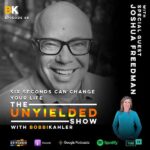Six Seconds – Six Seconds is a global nonprofit research organization turning the science of emotional intelligence into practical tools. Joshua shares the exciting story behind the name "Six Seconds."
The Logic of Emotions – We all need to understand the logic of emotions clearly. Joshua points out the significance of understanding the reason for feelings.
Emotional Intelligence – According to Joshua, emotions are merely data, and emotional intelligence is analyzing such data to find the value it can provide.
Uncomfortable emotions – Joshua emphasizes the necessity of letting go of the idea of positive and negative feelings. Instead, he asks to be friends with all the feelings.
Self-doubt – We talk about how we always get self-doubts when we realize that reality is more complex and nuanced than fairy tales we have heard about being successful.
Practice emotional Intelligence – Joshua explains practicing emotional intelligence as three steps process. We dive deep into each step and how to implement them in your life.
Fear - Joshua defines fear as a feeling to protect us. Furthermore, he says that it is there to challenge us to think more deeply, and it helps us clarify what's essential.
Five Years From Now – When you struggle with your emotions, ask yourself who you want to be when you look back at five years from now. You will get a brand new perspective about the situation.
Trouble Train – We discuss why it is vital to deal with emotions early instead of letting them grow and looking for a remedy once they become violent.
Connet with Joshua Freedman
Website: jmfreedman.com/
LinkedIn: linkedin.com/in/freedman/
Twitter: twitter.com/eqjosh
Vimeo: vimeo.com/6seconds
Six Seconds Website: 6seconds.org/
Six Seconds Facebook: facebook.com/sixseconds
Six Seconds Youtube: youtube.com/c/SixSeconds
Mentioned in the Episode
Emotional Intelligence: Why It Can Matter More Than IQ: goodreads.com/book/show/26329.Emotional_Intelligence?from_search=true&from_srp=true&qid=BwYsl8tZ1N&rank=2
At the Heart of Leadership: How to Get Results with Emotional Intelligence: goodreads.com/book/show/19030001-at-the-heart-of-leadership?from_search=true&from_srp=true&qid=xMKQXaS8ty&rank=1
Inside change: Transforming your organization with emotional intelligencegoodreads.com/book/show/8765291-inside-change?from_search=true&from_srp=true&qid=pFGawdnmcy&rank=1
Upside of stress: goodreads.com/book/show/23281639-the-upside-of-stress?from_search=true&from_srp=true&qid=UHRgIhOxLa&rank=1
Bobbi's Takeaways
This is going to be tough to keep it to 3, but here are my three insights for thriving:
-
Emotions are like a train leaving the station. When something happens, deal with the emotion when they are small, when they are just leaving the station, before the train has picked up speed and momentum. I loved Josh’s approach: 1) don’t judge the emotion as good, bad, positive, or negative. It is merely data; 2) tune into and find the value that it can provide; 3) then take intentional action
-
Our brains love over-simplification and certainty. We actually get a dopamine reward for being right. Which, I think, is why we’re sometimes getting a little stuck there and why maybe we continue doing the things we’ve always done, even when we have that voice inside of us saying, maybe there’s something more. We also get a dopamine reward for trying something new and learning something new. Maybe the awareness of that reward when we try something new can create a pulling effect for us that helps us break through old ceilings.
-
I loved the conversation about how we have narratives, which are really like fairy tales – but I think we believe the narratives as though they are true. The problem is when we don’t measure up to the narrative, we can then become wrapped in self-doubt. And, when we feel self-doubt, we think: what is wrong with me that I have doubt? The answer: absolutely nothing. It means you are human. This is where, for me, when I tune into how what I am doing benefits others, that self-doubt fades a little. I had someone tell me the other day that “It never seems like you have self-doubt.” I almost laughed. I have doubts and fears. They just don’t get to boss me around.








